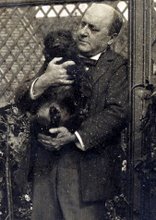 It has also been on my mind to add John Quincy Adams to the honor roll of founders. Adams was President of the United States for a single term, but was defeated for reelection by Andrew Jackson in 1828. Jackson is celebrated as one of the founders of the Democratic Party, and of party politics; he and his campaign manager, Martin Van Buren, discovered that a grass-roots, national political party was a machine with which the Electoral College, and the constitution's restraints on direct democracy, could be unseated. Adams' memory accordingly has been shouted down in repeated celebrations of Jackson's triumph. Adams was a terrible politician who hated campaigns and publicity. He sat for the first photographs taken of an American president, in which one can see his dislike and resentment of the necessities of public life. I prefer the paintings like this one (courtesy of Wikipedia Commons) that show both his forbidding public face as well as his private good nature. Adams was a "conscience Whig," a bitter opponent of slavery; he had a vision of a federal government that would reserve the vast wealth of natural resources in North America for public purposes and keep them out of private hands. Like his father, the first president Adams, he believed the United States to be a great and diverse empire, with native American and European settlements united by common ideals. Like his friend Henry Clay, he would rather be right than president; not a bad motto. Not perhaps a realistis one, and Adams died embittered by defeat, but then Whigs are the anti-realist party.
It has also been on my mind to add John Quincy Adams to the honor roll of founders. Adams was President of the United States for a single term, but was defeated for reelection by Andrew Jackson in 1828. Jackson is celebrated as one of the founders of the Democratic Party, and of party politics; he and his campaign manager, Martin Van Buren, discovered that a grass-roots, national political party was a machine with which the Electoral College, and the constitution's restraints on direct democracy, could be unseated. Adams' memory accordingly has been shouted down in repeated celebrations of Jackson's triumph. Adams was a terrible politician who hated campaigns and publicity. He sat for the first photographs taken of an American president, in which one can see his dislike and resentment of the necessities of public life. I prefer the paintings like this one (courtesy of Wikipedia Commons) that show both his forbidding public face as well as his private good nature. Adams was a "conscience Whig," a bitter opponent of slavery; he had a vision of a federal government that would reserve the vast wealth of natural resources in North America for public purposes and keep them out of private hands. Like his father, the first president Adams, he believed the United States to be a great and diverse empire, with native American and European settlements united by common ideals. Like his friend Henry Clay, he would rather be right than president; not a bad motto. Not perhaps a realistis one, and Adams died embittered by defeat, but then Whigs are the anti-realist party.
Thursday, September 27, 2007
john quincy adams
 It has also been on my mind to add John Quincy Adams to the honor roll of founders. Adams was President of the United States for a single term, but was defeated for reelection by Andrew Jackson in 1828. Jackson is celebrated as one of the founders of the Democratic Party, and of party politics; he and his campaign manager, Martin Van Buren, discovered that a grass-roots, national political party was a machine with which the Electoral College, and the constitution's restraints on direct democracy, could be unseated. Adams' memory accordingly has been shouted down in repeated celebrations of Jackson's triumph. Adams was a terrible politician who hated campaigns and publicity. He sat for the first photographs taken of an American president, in which one can see his dislike and resentment of the necessities of public life. I prefer the paintings like this one (courtesy of Wikipedia Commons) that show both his forbidding public face as well as his private good nature. Adams was a "conscience Whig," a bitter opponent of slavery; he had a vision of a federal government that would reserve the vast wealth of natural resources in North America for public purposes and keep them out of private hands. Like his father, the first president Adams, he believed the United States to be a great and diverse empire, with native American and European settlements united by common ideals. Like his friend Henry Clay, he would rather be right than president; not a bad motto. Not perhaps a realistis one, and Adams died embittered by defeat, but then Whigs are the anti-realist party.
It has also been on my mind to add John Quincy Adams to the honor roll of founders. Adams was President of the United States for a single term, but was defeated for reelection by Andrew Jackson in 1828. Jackson is celebrated as one of the founders of the Democratic Party, and of party politics; he and his campaign manager, Martin Van Buren, discovered that a grass-roots, national political party was a machine with which the Electoral College, and the constitution's restraints on direct democracy, could be unseated. Adams' memory accordingly has been shouted down in repeated celebrations of Jackson's triumph. Adams was a terrible politician who hated campaigns and publicity. He sat for the first photographs taken of an American president, in which one can see his dislike and resentment of the necessities of public life. I prefer the paintings like this one (courtesy of Wikipedia Commons) that show both his forbidding public face as well as his private good nature. Adams was a "conscience Whig," a bitter opponent of slavery; he had a vision of a federal government that would reserve the vast wealth of natural resources in North America for public purposes and keep them out of private hands. Like his father, the first president Adams, he believed the United States to be a great and diverse empire, with native American and European settlements united by common ideals. Like his friend Henry Clay, he would rather be right than president; not a bad motto. Not perhaps a realistis one, and Adams died embittered by defeat, but then Whigs are the anti-realist party.
Subscribe to:
Post Comments (Atom)




No comments:
Post a Comment